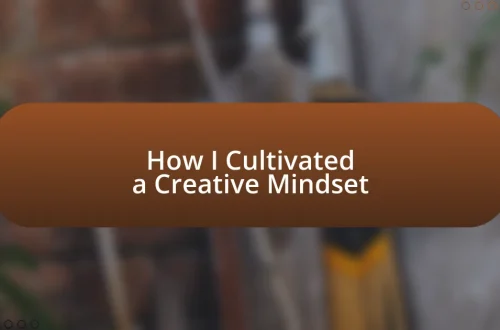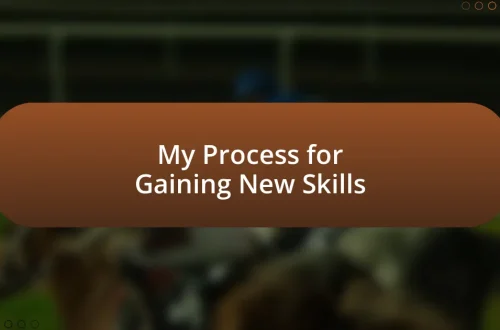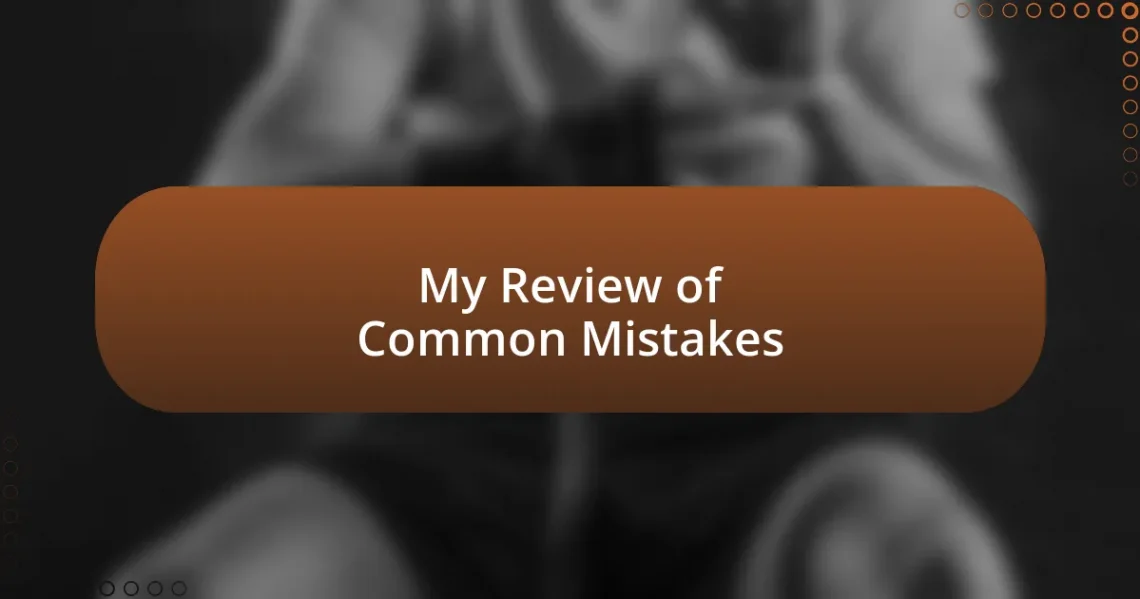
My Review of Common Mistakes
Key takeaways:
- Recognizing and analyzing mistakes promotes growth, revealing behavioral patterns and improving decision-making.
- Establishing clear goals and proactive steps, like double-checking work and seeking feedback, significantly reduces errors.
- Learning from mistakes involves reflection, sharing experiences, and fostering a culture of openness and trust within teams.
- Applying insights from past mistakes enhances preparedness and encourages collaboration, leading to better outcomes in future projects.
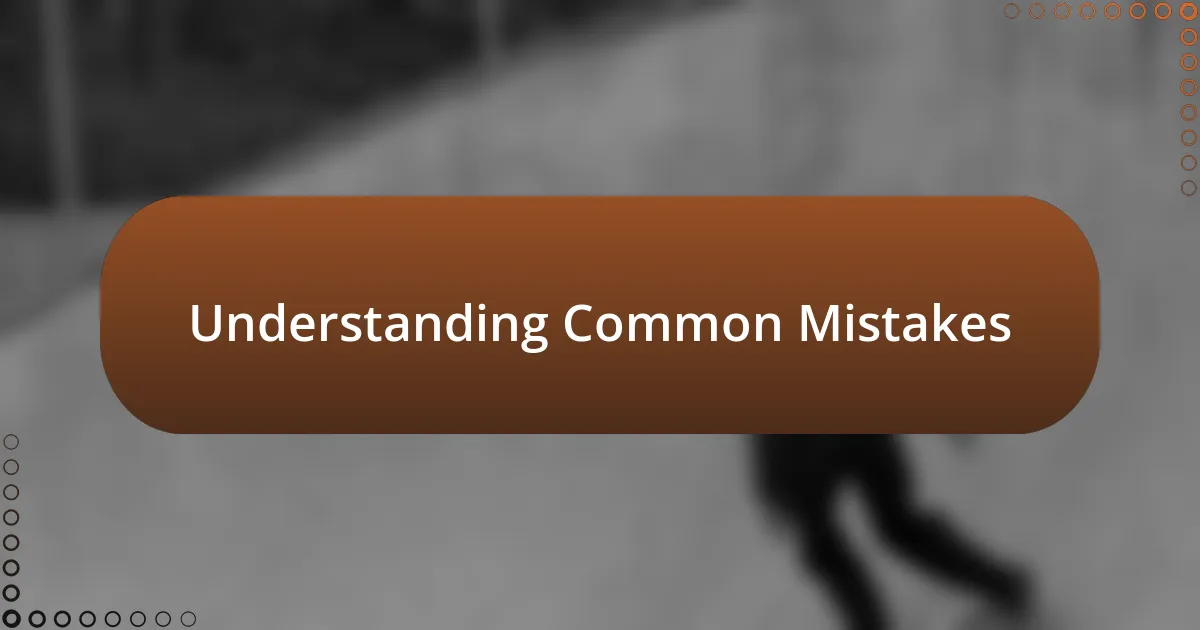
Understanding Common Mistakes
Understanding common mistakes is about recognizing patterns in our behaviors that lead us astray. I remember a time when I overlooked the importance of planning, thinking I could wing it. It didn’t take long for me to realize that skipping this step resulted in chaos and mistakes that could’ve been avoided.
Have you ever found yourself rushing through tasks, only to make careless errors? I’ve been there, and it’s frustrating. This haste often stems from a desire to move quickly, but those moments of impatience can lead to oversights that haunt us later on.
It’s crucial to approach mistakes with a mindset of learning rather than embarrassment. I once felt deeply ashamed after a major blunder at work, but reflecting on that experience shifted my perspective. It taught me that each mistake offers invaluable lessons that can enhance our skills and decision-making in the long run.
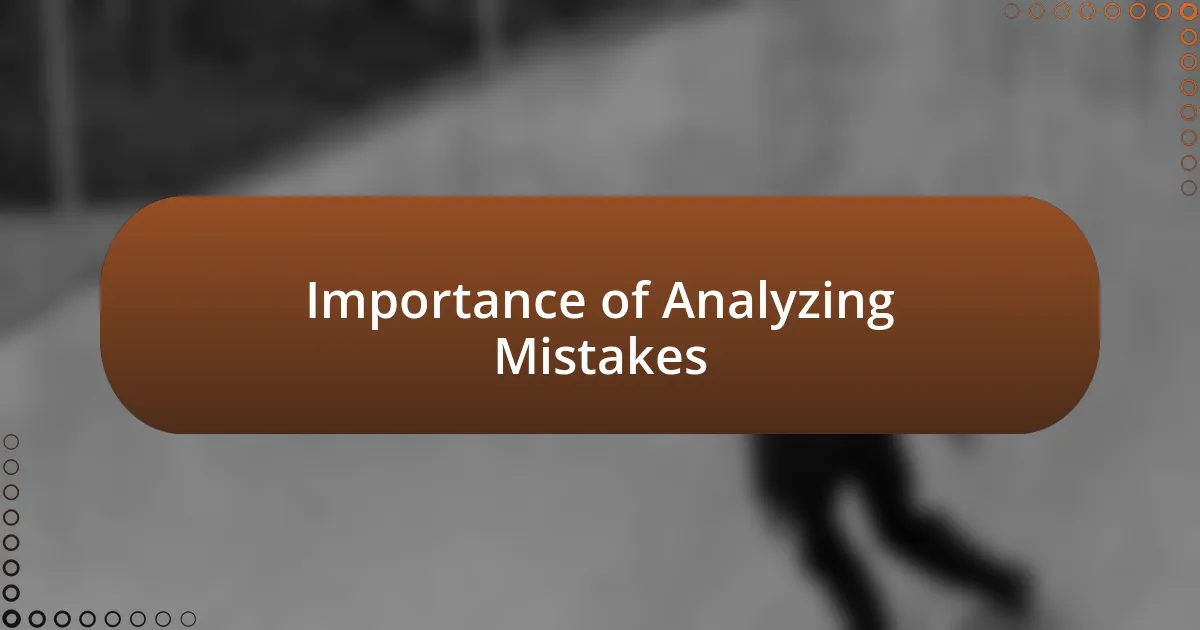
Importance of Analyzing Mistakes
Analyzing mistakes is a powerful tool for growth and development. When I reflect on my errors, I often notice that they reveal larger trends in my decision-making process. For instance, after a failed project, I took the time to evaluate what went wrong. I discovered that I had not asked enough questions upfront, which led to misaligned expectations. This realization pushed me to adopt a more inquisitive approach in future projects.
The importance of this analysis cannot be overstated. Each mistake serves as a stepping stone, guiding us through a learning curve that can enhance our skills. I remember a daunting performance review where my supervisor highlighted a few stark missteps in my presentation style. At first, it stung. But later, I embraced this feedback, practiced diligently, and transformed those missteps into strengths that ultimately boosted my confidence.
Moreover, analyzing mistakes encourages a culture of openness. I’ve seen teams that share their blunders create an environment of trust. For example, during a team debrief, a colleague confessed to miscalculating a budget. Instead of criticism, the team rallied to understand the situation together, leading to meaningful discussions about clarity and communication. This collective reflection not only strengthened our bond but also reinforced key lessons for future endeavors.
| Benefits | Examples |
|---|---|
| Understanding Behavior Patterns | Examining recurring mistakes helps identify habits that lead to errors. |
| Encouraging a Growth Mindset | Learning from mistakes fosters resilience and adaptability. |
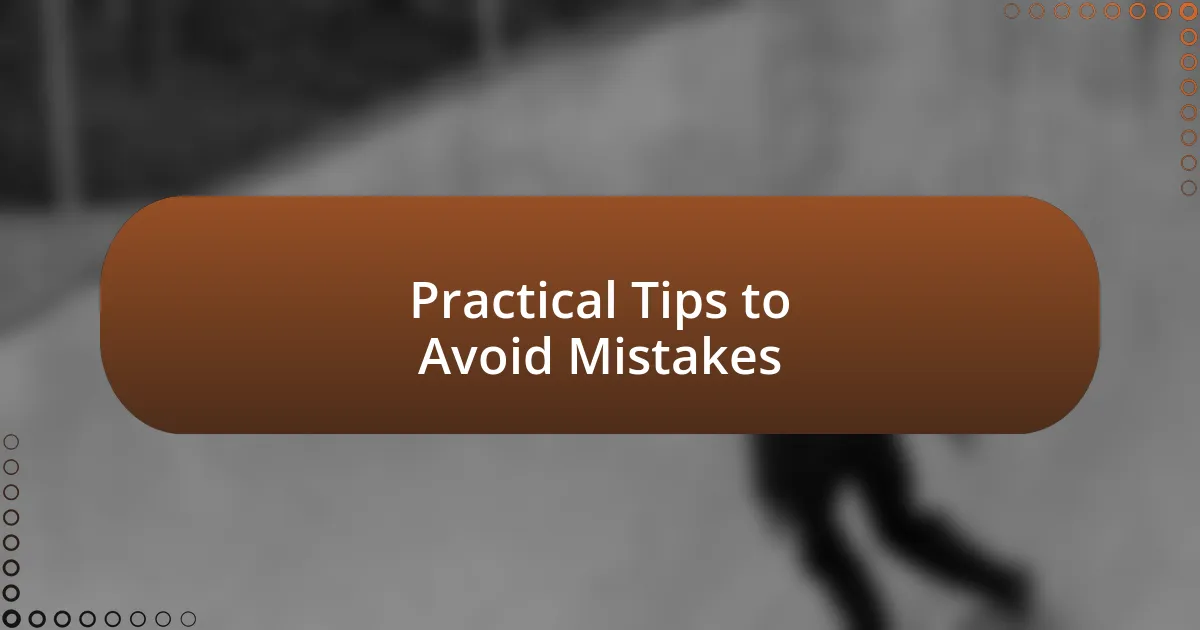
Practical Tips to Avoid Mistakes
It’s easy to make mistakes, but taking proactive steps can significantly reduce their impact. From my experience, setting clear goals before starting a task helps keep me focused and minimizes errors. I find that when I outline my objectives, I can better align my actions with my desired outcomes, which leads to fewer missteps.
Here are some practical tips to avoid mistakes:
- Double-Check Your Work: A simple review can catch errors before they escalate.
- Ask Questions: Clarifying doubts at the onset prevents misunderstandings later on.
- Break Tasks into Smaller Steps: This makes complex projects more manageable and reduces overwhelm.
- Seek Feedback Early: Getting input from others can provide valuable insights and catch potential errors.
- Take Breaks: Stepping away can refresh your mind and help you see flaws you might have missed.
I recall a time when I underestimated the importance of those steps. I rushed through a presentation without thorough practice, and it became clear I hadn’t anticipated the audience’s questions. By taking the time to prepare properly—reviewing my content, rehearsing, and inviting feedback from a colleague—I turned things around in my subsequent presentations. That experience taught me the significance of diligence and foresight, which continue to guide me today.
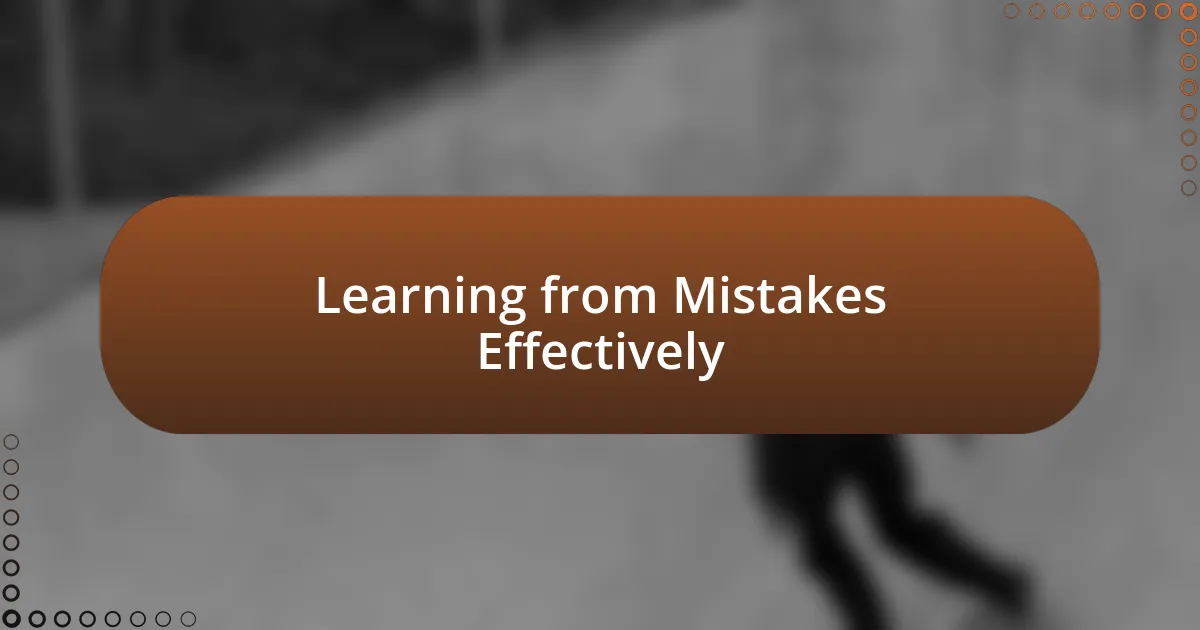
Learning from Mistakes Effectively
Mistakes can feel disheartening, but they offer a powerful opportunity for growth if we let them. One significant lesson I learned was during a project where I completely mismanaged my time. Instead of sulking in defeat, I took a step back and analyzed what went wrong, realizing that my lack of a structured timeline was the core issue. I often wonder: how many times do we merely brush off our errors instead of dissecting them for valuable insights?
As I delved deeper into my mistakes, I discovered that reflecting on my actions helped me identify patterns in my behavior. For instance, I noticed that during stressful periods, I tended to skip the planning stages, which led to even more mistakes. By documenting my missteps and their triggers, I built a framework for improvement. This has empowered me to approach new challenges with a more strategic mindset. Doesn’t it make sense to leverage our experiences to shape future success?
The emotional weight of learning from mistakes can be significant, yet it can also ignite determination. I vividly remember feeling embarrassed after miscommunicating expectations with my team. It was a tough moment, but I chose to share my experience with others, which sparked an open conversation about accountability. It dawned on me that vulnerability in sharing mistakes not only fosters trust but also cultivates a culture of growth. Isn’t it liberating to think that our stumbles can lead to collective wisdom?
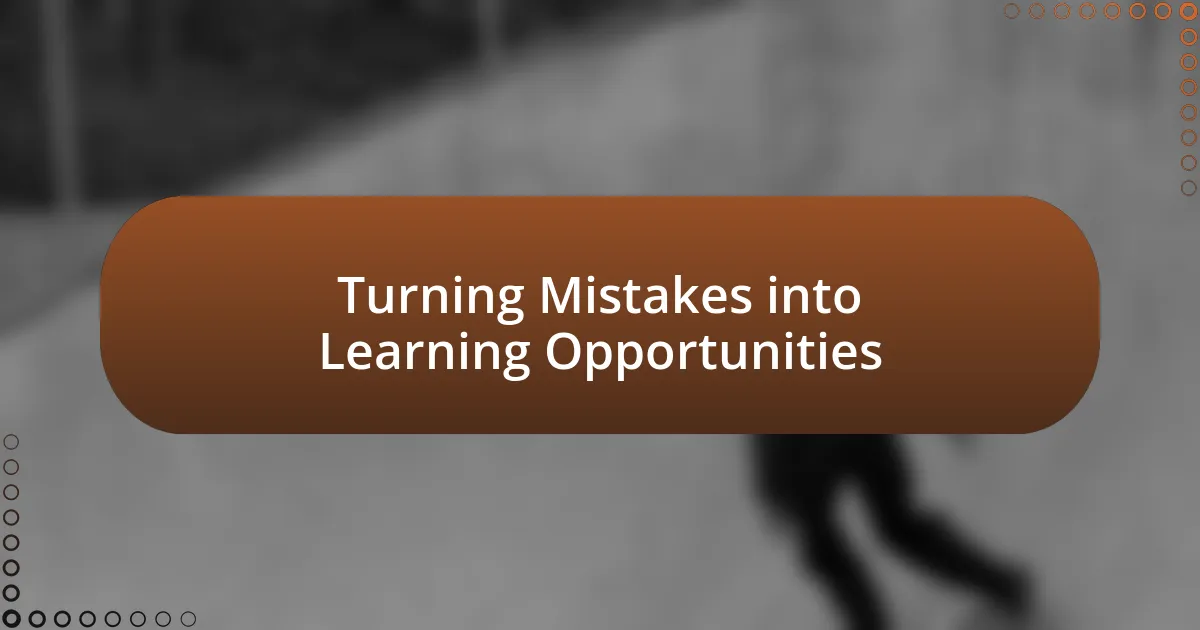
Turning Mistakes into Learning Opportunities
Acknowledging mistakes is the first step in turning them into valuable lessons. I still recall a presentation I flubbed; my nerves got the best of me, and I forgot key points. Rather than letting that experience haunt me, I started practicing by presenting in front of friends first. Wasn’t that a game-changer? They provided feedback that helped me refine my delivery, transforming a nerve-wracking moment into a constructive practice session.
One of the most enlightening moments in my journey was when I misjudged a client’s needs during a project. Instead of burying my head in the sand, I chose to reach out and ask for clarity. Through that conversation, I discovered not only my oversight but also how important communication is in client relations. Have you ever realized that asking questions can lead to greater understanding? It was a lesson that shifted my perspective entirely, reinforcing the idea that collaboration can turn mistakes into stepping stones.
I remember a time when I underestimated the complexity of a task, resulting in a significant delay. Initially, I felt ashamed, but then I took a deep breath and examined what went wrong. Reflecting on that moment, I realized the importance of thorough preparation. It’s fascinating how our hardest lessons can teach us the most about ourselves. Isn’t it incredible to think that each mistake holds the potential to unlock new levels of resilience and insight?
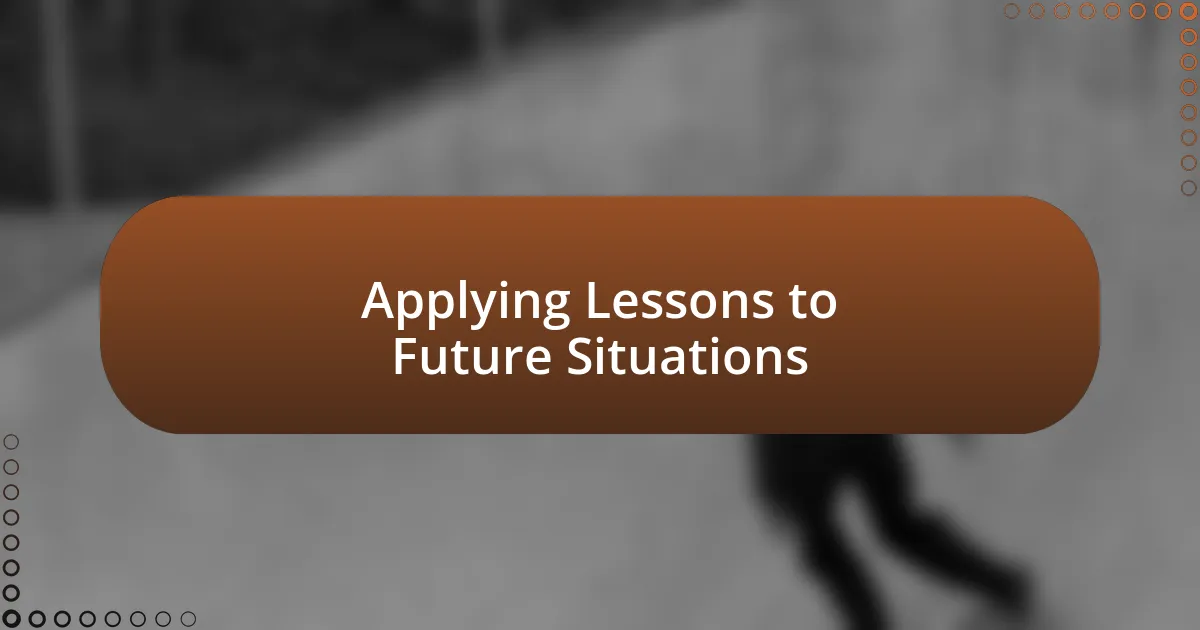
Applying Lessons to Future Situations
When I first started managing a team, I struggled with delegation, often taking on too much myself. After a particularly chaotic week full of missed deadlines, I took a moment to reflect. It became clear to me that trusting others not only lightened my load but also empowered my team. How often do we forget that collaboration can enhance productivity?
A few months ago, I faced a setback in a project due to inadequate research on my part. I felt a wave of disappointment wash over me, but instead of lingering in that feeling, I turned it into a springboard for improvement. I dedicated time to thoroughly review project requirements and sought input from colleagues who had more experience in that area. Hasn’t it been said that knowledge is power? That realization changed my approach to future assignments, instilling a sense of preparedness that I hadn’t previously prioritized.
More recently, while working on a marketing campaign, I miscalculated the timing of our advertisements, leading to a less-than-ideal response from our target audience. This misstep stung at first. I spent evenings reflecting on how to avoid such a gap in timing again. In that introspection, I recognized the value of feedback loops and continuous monitoring. Wouldn’t you agree that real-time adjustments often yield the best results? Embracing this lesson has made me more proactive and responsive in future campaigns.



